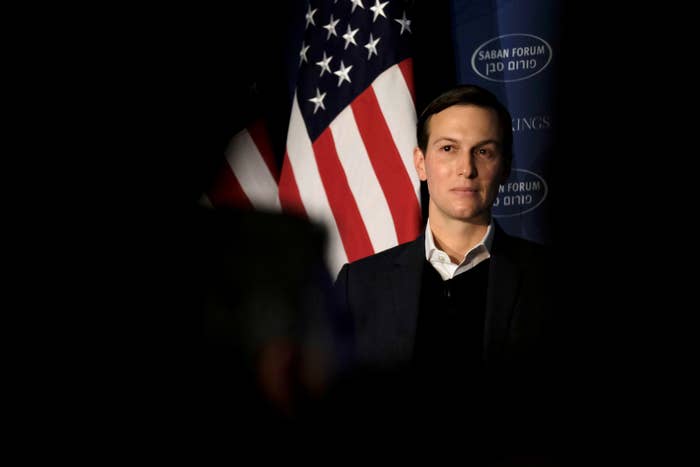
Just days before heading to a West Wing job, Donald Trump’s son-in-law, Jared Kushner, was secretly engaged in talks to sell his struggling news organization, the New York Observer, to Clinton megadonor and Univision chair Haim Saban and Hillary Clinton ally David Brock — a progressive media figure with aspirations to turn the news outlet into “the Breitbart of the left.”
After the 2016 election, Kushner and Observer Media chair Joseph Meyer reportedly sought to offload the paper to Trump allies, including American Media, the parent company of the National Enquirer, one of the media publications that portrayed Trump in a positive light during the campaign. But according to two sources, Kushner and Meyer found more attractive suitors in Hillaryland.
In the days after the election, Observer Media executives took part in discussions with Saban and Brock. A source familiar with the matter said that Kushner did not initiate the talks and largely recused himself after an initial discussion, though he did not have any apparent reservations about selling to his father-in-law’s sworn enemies. Ken Kurson, then editor-in-chief of the Observer, confirmed to BuzzFeed News that he and Meyer spoke with Saban on the phone that winter. In January 2017, Kurson met Brock one-on-one at the Greenwich Hotel, where the pair discussed the potential acquisition.
“I kept looking up to see if there was a black condor circling overhead, but in person this legendary Democratic assassin is perfectly friendly and reasonable. I was hoping a deal would happen, because for me personally, once Jared went to Washington, the fun of editing the Observer was diminished,” Kurson told BuzzFeed News of the meeting, adding that he hoped the family would find a buyer who could install a new editor and vision for the publication.
That vision, judging by its suitors' politics, might well have been unwelcoming to Kushner’s father-in-law and his coming administration. And the very fact of the talks reflects the odd — and increasingly tenuous — nature of Kushner's role as a Trump loyalist whose personal politics remain opaque and whose personal and business connections are distant from the populist Trump base.
Brock is a singular figure in American media. A young conservative star in the 1990s and the author of a critical biography of Hillary Clinton, he subsequently switched sides, renounced the right, and became a key fundraiser and strategist for Democratic Party organizations. Brock founded Media Matters, the progressive media watchdog which has spent the last three years savaging the pro-Trump media ecosystem beloved by the President; and American Bridge 21st Century, a Democratic opposition research group.
He’s also a figure of loathing on the right. Breitbart described Brock as being on a “crusade to destroy Republicans and the conservative media.” Fox News host Sean Hannity has called him “a liberal agitator.”
Brock declined to comment on his plans for the Observer.
But just a month before the Observer talks, Brock reportedly organized a post-election retreat with donors, including George Soros, with the mission statement being to “kick Donald Trump’s ass.” Saban, a brash media financier, was described by Politico in 2016 as “Team Clinton's favorite billionaire,” known for his personal involvement in the minute details of Hillary’s campaign. Saban was also vocal in his opposition of Trump, calling him “dangerous” and a “clown” before the election.
According to one source, Brock and Saban’s planned editorial direction for the site was made clear in the discussions. Just weeks before sitting down to discuss buying Kushner’s paper, Brock publicly declared his intention to turn his progressive website Shareblue into “the Breitbart of the left.” Saban, the source noted, was interested in having a presence in Washington.
The talks fell apart over money. Kushner, according to one source familiar with the discussions, wanted $20 million for the property — double what he paid for it in 2006. Kurson told BuzzFeed News he was never involved in any discussions of the financials. Two sources close to Kushner told BuzzFeed News they were unaware of the discussions. Jared Kushner could not be reached directly for comment.
And if you want to read more about tech, media and the future of the internet's information wars, subscribe to Infowarzel, a BuzzFeed News newsletter by the author of this piece, Charlie Warzel.
